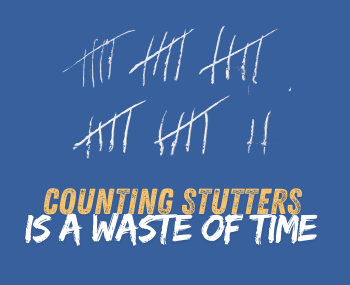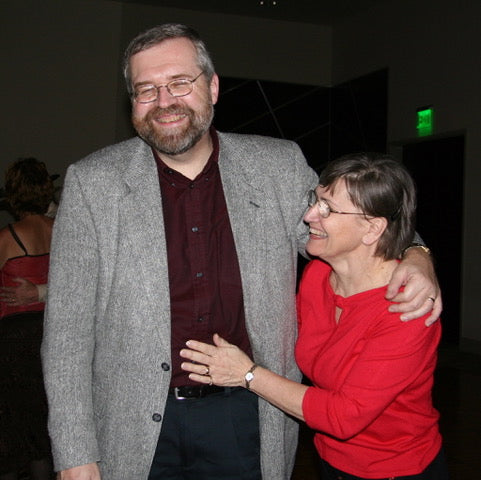Practical Thoughts Blog

Feb 19, 2026
Why can stuttering be so confusing to listeners? Part 1: Variability
Stuttering varies. Everyone knows that. The amount of stuttering that people experience on the inside or show on the outside changes depending upon the situation in which they are speaking, the specific speaking task in which they are engaged, the conversational partner or listener to whom they are speaking, and more; it also varies at different points in time, within the same day or across...

Apr 21, 2025
Counting Stutters Is a Waste of Time!
When assessing stuttering, counting stutters does not reflect the overall experience of the person who stutters. Speech pathologists can stop counting stutters because listeners cannot observe stutters that a person experiences, the nature of stuttering is that it is always variable, some people who stutter can appear fluent by altering their communication in unhelpful ways, and stuttering is a complex communication difference, and cannot be...

Apr 07, 2025
If Stuttering Is Verbal Diversity, then Is It Still a Disorder?
Stuttering is a disorder and a difference. Stuttering is a disability if the person who stutters experiences negative impact because of their stuttering. Confusion regarding specific terminology in the neurodiversity era provides us an opportunity to clarify some of the terminology that can be confusing for clinicians and caregivers alike. These discussions about terminology can enhance our understanding of the life experiences of those who...

Feb 19, 2025
Remembering Our Dear Friend, Dr. Bob Quesal
Many of our readers recognize Bob as the co-author of the OASES and the Minimizing Bullying program. Bob’s contributions to the field are truly groundbreaking [see several links below]. Throughout his career, he championed the voices of people who stutter, from his earliest writings that reminded speech-language pathologists not to forget people who stutter, to his longstanding studies on the life experiences of people who...

Oct 17, 2024
If I don’t count stutters, how can I qualify people for therapy?
You’ve probably heard that our field is moving away from using stuttering frequency counts as a way of measuring stuttering. In our opinion, this is a very good development—it is something that we have been encouraging for quite a while now, and it is increasingly important as we come to view stuttering as an example of Verbal Diversity. (For more discussion of stuttering as Verbal...

Jul 25, 2024
Shifting Perspectives About Stuttering
In the era of expanding our understanding of neurodiversity-affirming stuttering therapy, a first step is to make certain we, as speech-language pathologists (SLPs), are approaching assessment and therapy from the perspective of the person who stutters. Their experiences inform our therapy planning. There are reasons why our past professional practices were based upon the listener's observations of stuttering, and there are three major reasons why...

Nov 13, 2023
What is Verbal Diversity?
The Emergence of Verbal Diversity Before we delve into the concept of "verbal diversity," it's essential to understand the background of stuttering in society. In brief, stuttering has historically been viewed as a flaw, a burden, or something that needed to be "fixed." People who stutter have been subjected to therapies aimed at eliminating their disfluencies. This type of therapy has frequently led to frustration, low...

May 24, 2023
Challenging Eligibility Criteria for Stuttering Services in the Schools
As our understanding of the speaker’s experience of stuttering increases via research evidence, patient evidence, and clinical practice, eligibility criteria for receiving stuttering services in the schools must be analyzed and challenged.

Mar 28, 2023
What treatment approach should I use with a particular young child who stutters?
In several earlier blog posts, I have stressed the importance of individualized treatment for young children who stutter and their families. Now, it's time to take a look at what factors guide me toward one approach or another...

Jan 27, 2022
Why do people stutter less (or more) when reading?
It is commonly reported that people stutter less when reading. At the same time, some people actually stutter more when reading. Why is that, and what does it mean for our understanding of stuttering?

Jan 21, 2022
What do people who stutter want from stuttering therapy?
The best way to learn about what people who stutter want from stuttering therapy is to listen to them. This post highlights the importance of learning from people about their personal journeys with stuttering so that SLPs can ensure that we are aligned with our clients true goals and desires for therapy.

Sep 23, 2021
Virtual Reality for Speech Therapy? SOON!
Virtual reality for stuttering therapy? Our guest blogger, Gareth Wilkom is working on it! He tells his "whys" and shares his excitement for the potential of using VR to help those who stutter learn to handle speaking situations outside of therapy and into the real world!
